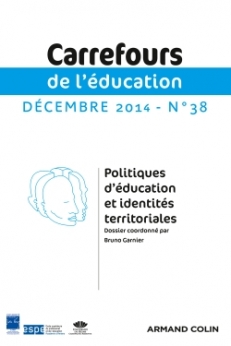
Carrefours de l'éducation n° 38 (2/2014)
Pour acheter ce numéro, contactez-nous
Recevez les numéros de l'année en cours et accédez à l'intégralité des articles en ligne.
L’impact social et culturel de la construction éducative européenne. L’Union Européenne a peu de compétences juridiques dans le domaine éducatif, néanmoins la construction Européenne a un impact évident sur l’éducation, le processus de Bologne le montre. Mais a-t-elle un rôle constructif, comme dans les constructions nationales, ou bien déconstructif ? L’éducation prépare ici la communauté humaine sur un territoire en pleine expansion économique, et c’est quand le grand marché s’ouvre que l’UE en a besoin, et qu’elle devient une compétence communautaire. Mais le marché débordant du cadre national, qu’advient-il de la communication et de l’homogénéité culturelle dont l’État a fait un outil puissant au service de la croissance comme l’a montré E. Gellner ? L’article montre que la question centrale est celle de la mobilité et de l’exosocialisation comme l’appelle Gellner, et que les systèmes ne sont pas affectés de manière homogène. La nouvelle forme d’exosocialisation est cosmopolite, concerne peu le primaire, un peu plus le secondaire et touche par excellence le supérieur. Les États ménagent ainsi identité nationale et ouverture exosocialisante. On peut parler d’impact différencié de l’exosocialisation, et d’apparition d’un nouvel habitus menant tendanciellement à la diglossie, qui est d’abord le fait des élites.
The Social and Cultural Impact of the Building of an Europe of Education The European Union has few direct responsibilities regarding education, yet the process of European construction has obvious consequences on education, as the Bologna process shows. But is its role constructive, as in national constructions, or deconstructive? Education here consists in preparing the human community on a territory going through economic expansion, and it is when the Europe-wide market opens that the EU needs it, and that it becomes relevant to the European community. But when a market goes beyond national boundaries, what becomes of the communication of cultural homogeneity, which the State has transformed into a powerful tool for growth, as E. Gellner has shown? This paper shows that the main question is that of mobility and exo-socialisation, as Gellner calls it, and that school systems are not affected in homogeneous ways. The new form of exo-socialisation is cosmopolitan, is not very relevant to primary school, a bit more to secondary school, and concerns mainly higher education. Thus do the states manage to combine national identity and exo-socialisation. What we are seeing is the differentiatedimpact of exo-socialisation, and the appearance of a new habitus tending towards diglossia, which is first and foremost a characteristic of the elites.